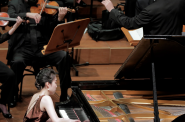The 99-Year-Old Piano Whiz
Milwaukee native and internationally-known pianist Frank Glazer made his New York debut in 1936.
Few professional pianists can also claim the titles of composer, piano technician and internationally-known performer.
And few if any continue to perform at age 99. But Frank Glazer does.
“In the whole history of pianists performing, there’s very, very few who played at 100 or 101,” Glazer says, “and I’m quite sure, from what I’ve seen of the programs, they never played the kind of program of substance that I’m playing.”
Glazer discovered the instrument when he was just 3 and started taking lessons four years later. A Milwaukee native, he continued to practice through high school. At the age of 17, he traveled to Berlin to study with world famous pianist, Artur Schnabel, who knew Brahms and Bruckner and made his debut in 1897.
Glazer went on to perform on nearly every continent. While he can’t pick a favorite concert, he takes special note of “milestone” performances. His latest was on his 99th birthday when he played at the Boston Athenaeum.
“I reached a high point,” Glazer says. “It was a great surprise and a pleasant one. By that, I mean I played better than I have ever played in my life, I think. And since my playing is still getting better, I keep doing it because people seems to like it, and they get the message.”
That musical message will be heard during the pianist’s performance on Sunday at the Wisconsin Conservatory of Music. Characteristic of his past concerts, the program will include pieces not well-known to American audiences, like Smetana’s “Hulan” and “Jhala” by Alan Hovhaness.
“It’s always nice to have something fresh that people don’t know but are beautiful,” Glazer says, “so as to stretch their minds with music and not hear the same thing all over again. People like to hear a different repertoire as long as it’s good. And these are good, all of them.”
Maintaining a vast repertoire is a lot of work for Glazer, but it limits his chances of repeating set lists in neighboring cities. Steeped in the philosophy of taking “the path of most resistance,” he believes in performing whatever songs work best for a given concert rather than ones he can play easily. He insists he doesn’t reduce his energy or intensity while playing to accommodate his age, satisfying a moral obligation to his audience.
“I do it because it’s the right thing to do,” he explains. “I don’t do it just to make it difficult, but I can’t help it if it happens to be.”
Glazer made his concert debut at New York’s Town Hall when he was 21. Almost three years after serving in World War II, he played Carnegie Hall. He later hosted a classical music show on WTMJ-TV before appearing on national NBC programming with Arlene Francis and Hugh Downs. In desperate situations, he even tuned his own pianos.
For the past 34 years, Glazer has been an artist-in-residence at Bates College in Maine, giving concerts on campus and lecturing on various musical genres.While his skills continue to develop, his popularity was not what it was decades ago.
“Nowadays, people don’t know me because they’re all gone, my people, my friends, because I got to be so old,” he says.
Gone with them are the days without electronic music, one of many changes the music industry underwent throughout Glazer’s long career. Contemporary musicians play faster and louder to compete with computers and amplified technology, but Glazer says those efforts are futile.
“No matter how fast you play, faster than anybody in the whole world, you still can’t play as fast as a computer can do it, so let’s forget about the speed and get down to the essence of the music.”
The feelings and ideas that classical music instills in the souls of its listeners give Glazer the inspiration to continue playing after so many decades. Emotional connections to his pieces improve his craft as an artist and keep him interested in works he’s played many times. “I’m continuing to grow and find new things in the great music I’m playing.”
Despite his accomplishments, Glazer’s humility about his singularly eventful life is is quite striking. “(One audience member) said, ‘I’ve been to practically all of your concerts, and I want to tell you that your concerts have been the greatest event of my life.’ Boy, you wonder what kind of a life she had.”
3 p.m. Sunday, May 18 at the Wisconsin Conservatory of Music. Tickets are $25, available onsite or by calling 414-276-5760.
Other Upcoming Events:
“Carmina Burana” by Bel Canto Chorus
Bel Canto Chorus is ringing in springtime with an unconventional music genre: protest songs.
In its final concert of the season, the chorus will perform “Carmina Burana,” a collection of medieval poems written in the 11th and 12th centuries and put to music by Carl Orff in the 1930s. The piece is best known for its first movement, “O Fortuna,” used in numerous films and television shows.
While the songs primarily focus on spring and young love, they also criticize the Catholic Church. Disillusioned monks and clerics who penned the poems used sarcasm and alliterative jokes to poke fun at the Church for its political ulterior moves. Richard Hynson, music director for the Bel Canto Chorus, compares them to protest songs from the likes of Woodie Guthrie.
“We don’t really have a complete picture of what life was like in the Middle Ages,” Hynson says, “but these songs give a very clear idea of who the good guys and bad guys were.”
Originally scored for a large orchestra and chorus, Bel Canto’s rendition of the cantata will use just two pianos and percussion, an arrangement Orff authorized so more groups could perform it. Hynson says this also allows the lyrics to be highlighted.
“The colors and the textures of the orchestra are rather overwhelming,” he explains, “and so this way, the words themselves have a much higher visibility.”
Preview
-
PianoArts Festival Features Rising Stars
 May 28th, 2024 by Michael Barndt
May 28th, 2024 by Michael Barndt
-
Four Nations Ensemble Goes For Baroque
 May 13th, 2024 by Michael Barndt
May 13th, 2024 by Michael Barndt
-
Mozart on Prospect Avenue
 May 9th, 2024 by Martha Brown
May 9th, 2024 by Martha Brown
























I love the piano more than any other instrument. Recently I heard a member of the Milwaukee Conservatory play a piece by Rachmaninoff and then tell a story about a 96-year-old man with whom he’d studied in France and learned so much more than he already knew, but the man was too frail to do concert tours himself, so this article about Frank Glazer is of particular interest to me. Usually it’s writers who continue on to the very end (e.g. Studs Terkel, who finished his last book and was going to send it off to his publisher in the morning, and went to sleep and died that night – but they still found his manuscript, which many others were awaiting!) Songwriters, too, can be any age and even in a wheelchairs but can still keep on composing songs and melodies for others to sing and play.